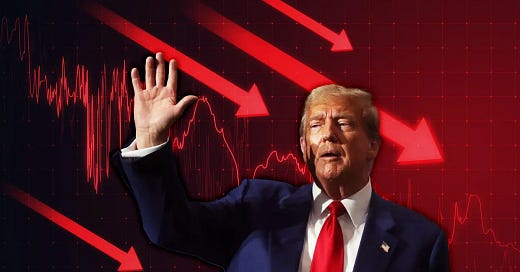Staying calm amid wild market swings isn't exactly a walk in the park, especially when every headline reads like a script for the next blockbuster disaster movie.
In the past couple of months, aggressive trade policies and escalating tariff wars have turned global markets upside down. One day, you wake up to hear that President Trump's "Liberation Day" has unleashed a barrage of tariffs: 10% on all imports, 34% on Chinese goods, and 25% on Canadian and Mexican products. The next, you're bombarded with rumors of an additional 50% tariff on China if they don't budge.
Meanwhile, retaliatory moves from Beijing and other trade partners have sent stock indexes on a rollercoaster ride that makes meme coin swings look positively tame.
For those of us with a stake in the market, this isn't exactly unprecedented territory, but it serves as a stark reminder that volatility is a fundamental aspect of investing. As Warren Buffett famously advised, “Be fearful when others are greedy, and greedy when others are fearful."
Right now, fear is palpable in the markets, and that's precisely when opportunity often presents itself.
While the constant barrage of doom and gloom can tempt you to make rash decisions—or at the very least, check your portfolio every five minutes—I've found that long-term, disciplined investing strategies still hold their ground. Instead of panicking every time the market dips or social media erupts with fresh trade war threats, I view these moments as opportunities.
When the market goes haywire, I deliberately add to my core holdings. Think of it as the ultimate clearance sale for quality companies. You wouldn't pass up a rare deal on something valuable, would you? This method, known as dollar-cost averaging, allows me to lower my average entry price, gradually building positions in solid, well-managed businesses. Sure, it might feel like watching a rollercoaster plummet, but if you're in it for the long haul, those dips can become more blessing than curse.
The news cycle of late has been relentless, and sometimes it feels like the economy is the punchline of a bad joke. But for those of us who have learned from past cycles, the key is to ignore the noise and stick with the plan. It's akin to being in choppy waters—panicking won't steady the boat, but calm, measured action helps you navigate to calmer seas.
I’ve come to believe that every downturn, no matter how dramatic, is just a momentary disruption. The fundamentals of great companies rarely change because of a tariff squabble, and therein lies the opportunity. When others flee in fear, quality assets often become available at discounted prices.
The most effective approach is to remain unfazed by the daily drama. Instead of reacting emotionally, I focus on my strategy and the proven strength of my investments.
As Peter Lynch once noted, "Far more money has been lost by investors preparing for corrections, or trying to anticipate corrections, than has been lost in corrections themselves."
Market volatility—the kind that dominates headlines—creates chances to acquire quality at attractive prices. While other investors rush for the exits, these temporary mispricings can set the stage for substantial future gains.
Volatility is simply the background noise of a vibrant, dynamic market. Yes, it can be maddening to witness such wild fluctuations, but history consistently shows that those who maintain their discipline tend to reap benefits when markets eventually stabilize.
Embrace the uncertainty, laugh off the absurdity of the relentless headlines, and remember that sometimes enduring a little chaos is necessary to capture the rewards of well-timed investments. After all, if markets didn't have their ups and downs, we'd have fewer opportunities to get ahead.
The investors who weather these storms with patience are typically the ones who emerge stronger. So take a deep breath, review your strategy, and consider whether these market gyrations might actually be presenting buying opportunities for the quality companies on your watchlist.
When the dust finally settles, it's those who maintained their composure—rather than succumbing to panic—who find themselves better positioned for long-term success.



